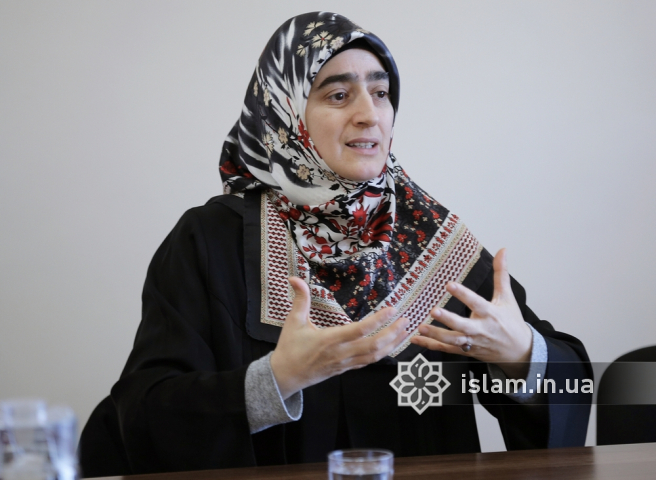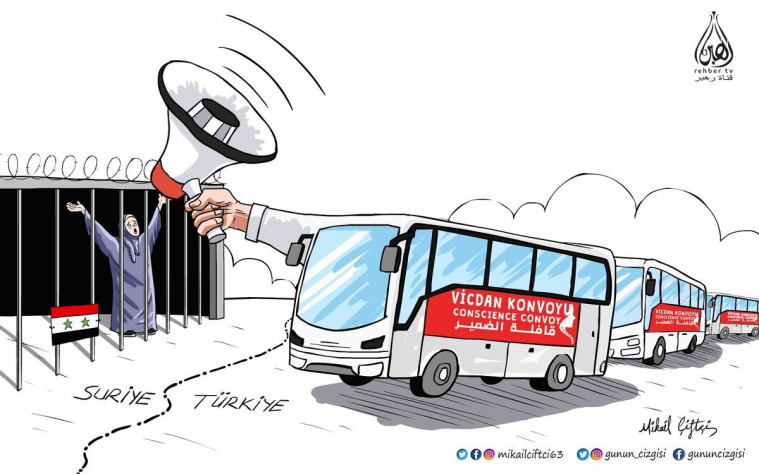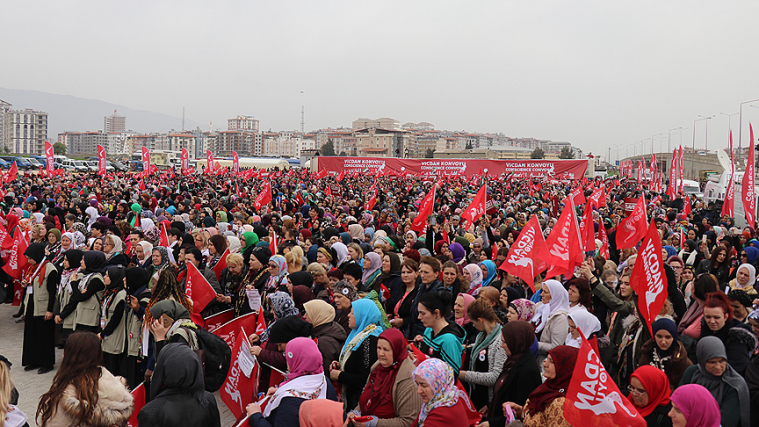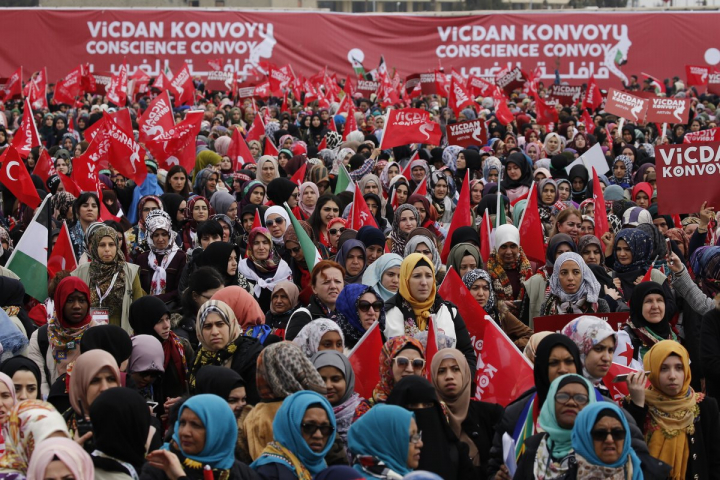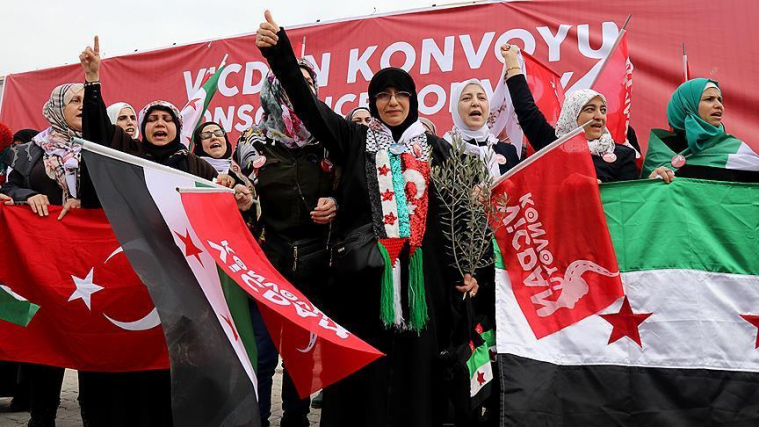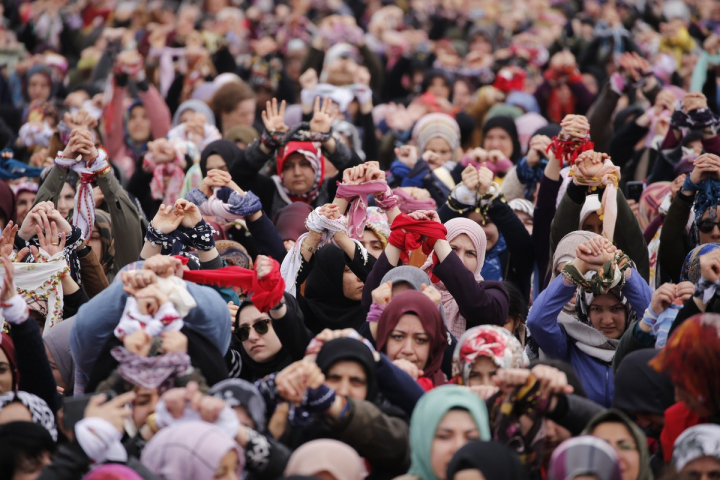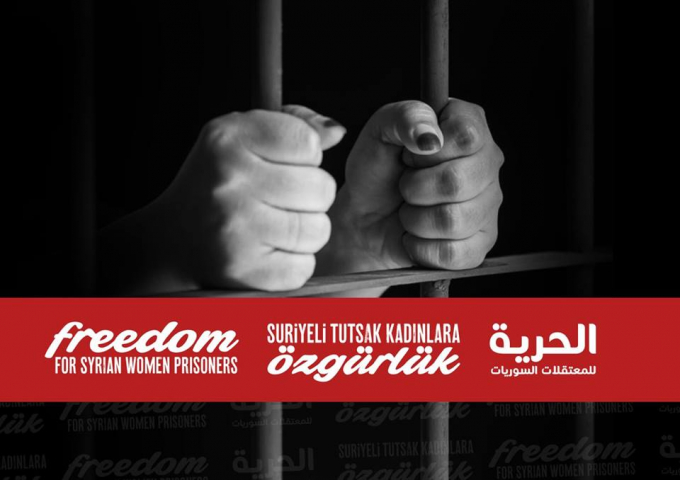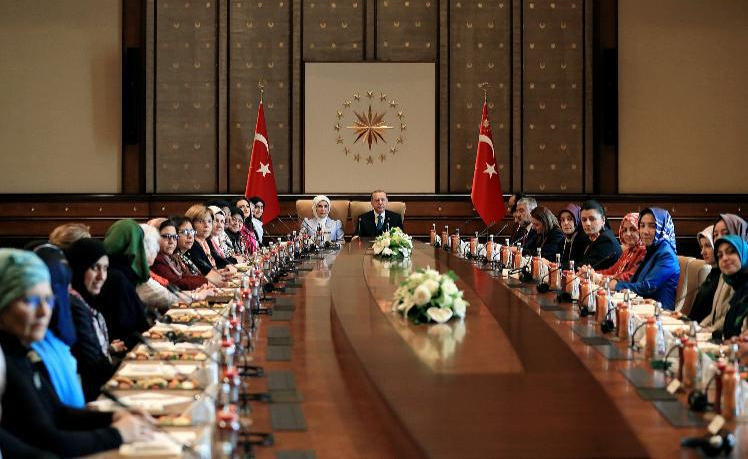A ‘Convoy of Conscience’ launched in Istanbul on 6 March, traveling to Hatay on the Turkish-Syrian border on 8 March. Participants from all over the world, including politicians, writers, public figures and ordinary housewives, demanded the release of women held in Syrian prisons.
As testified by the women who themselves were in the prisons of Assad regime, female inmates are being tortured and raped, and even when the rapes result in pregnancies and childbirth, the babies born in prison soon die due to tortures and malnutrition. At least one case was reported when a raped minor gave birth in the prison, and her baby was shot dead right in front of her. The young mother became mentally deranged since then.
That is why former Syrian prisoners, too, eagerly joined the Convoy.
Nalan Dal, IHH Humanitarian Relief Foundation International Fundraising Manager and one of the Convoy’s organizers, came to Ukraine to take part in the International Women’s Forum. She eagerly shared her thoughts about that experience and well as their plans for the further action.
In the first place, how did you come across the idea of gathering women all over the world?
It all came step by step. We started thinking - what should we do for the women in Syria, because people all over the world are acting as if nothing is happening. We knew things are happening and we couldn’t help them. But we had to do something! And then, gradually, we started discussing what actions must be taken. And in the end we came to a decision of making a convoy from Istanbul. But we didn’t know how many people would join — and suddenly within 15 days it was a giant convoy, from all over the world. We invited people and they came!
How did you spread the message?
— Through our contacts. For instance, in Ukraine we had a contact with Women’s Social Organisation “Maryam”, and we asked them to join and to talk to Ms.Olha Bogomolets to take part, we invited them, and asked to also spread the word in your country.
It was all about personal contacts. For example, I have a contact with Nelson Mandela’s family, so we contacted them, and they delegated two ladies, one of whom was Mr.Mandela’s daughter-in-law.
So it was only about personal connections - no social media, no nothing?
— We used social media as well, but it was a very short period of time, we didn’t reach immediately. It was the last three days when the social media was very strongly in, but the main part was done through the people that we knew. But now it has become a big movement, and we are going to continue our cause and visit many countries, including presidents, first ladies, politicians — because we want to really bring a change. And that change is — releasing the ladies from Syrian prisons. Including this ugly country, Russia — we will visit everybody, because they are the main people in Syria.
What about the logistics? I’ve seen the pictures, and there were all those beautiful buses with the same branding and everything. How did you manage to get enough of that?
— Well, during the last week before the convoy launched, everybody was sleeping only a few hours per day. We formed committees responsible for different tasks, For instance, there was a group of people dealing with only non-Turkish participants, while the other one was dealing with Turkish participants only (we had plenty of Turkish participants, as it was in our country).
Everyone filled in a form prior to the participation, and went through a sort of screening, for we couldn’t get everybody on board, and did our best to prevent ill-wishers from sneaking in and ruining everything.
And in the end, everyone signed the letter of acknowledgement that if anything happened during the convoy [between the participants], it was not our responsibility.
We also had to contact the government for them to provide us with an escort and security, and throughout the journey we had security officers with us, and the police were also involved — about 200 persons were responsible for our safety. We started with 60 or something when we boarded the buses in Istanbul, but in each city more and more people were joining us, and that meant increase in security.
Everything was well designed, well prepared — and only then we were on the road.
So you had a general idea how many people would join you in each of the cities?
— We didn’t expect that many people, but then, thank God, we ended up with 10,000. We were expecting like 5,000 to 7,000, because it was winter, and schools were open, and it was during the week — so, you know, everything was against us. But God made is easier for us.
How did the Turkish society perceive the idea of their women leaving everything behind and just going to the Syrian border?
— It was hard for many women, i should say. But I think many men supported the idea a lot, because in the end they are going to respond to God why they didn’t allow their women to participate. The case was very sensitive, the women there are being raped, your sisters in faith are being tortured. And then, if you don’t allow your women without any real reasons of not going there - it was just wrong for God-fearing people. So many were positive about that matter and supported — but, of course, there were some voices against as well.
Were there cases where men came to accompany their women for the fear of letting them participate unaccompanied?
— A few men were there, and they all weren’t Turkish. For example, there was a large group of ladies from South Africa, and they wanted some men to accompany them. It’s not that they were afraid, but some ladies were very sensitive to having a mahram (relative, guardian) around.
Still, male participants were maximum 5 to 6 people - out of 10,000.
But we had men to help us - like the bus drivers and facilitators. On each bus, there was a driver and a man responsible for all the logistics, just because men’s assistance is needed, like the sleeping bags need to be carried and everything.
What about the consequences? You said that you’ve managed to deliver the message that none of the governments could deliver — how did that happen?
— You know, social pressure is very effective, especially in politics. If you create the pressure group, it affects the governments there in such a way that they mold up their policies.
As I’ve told [during the International Women’s Forum], we didn’t expect the President of Turkey to invite us, we never intended to — because that was our call for the ladies, and we sent a letter to the first lady of almost every country, and to the female MPs in every country.
And then all of a sudden the President wants to receive us, because the cause became big and the voices were loud. We never expected it to be so big and so loud. Gathering people on every stop, we held press-conferences and the news came on many international media, and became very important news. Since then, we have been receiving very good phone calls, and now when the second stage of the project started, we are going to visit the countries, one by one, and meet the higher state officials to, first of all, to get the information of the problem on their agenda.
Whether they do or don’t do something about it — it’s their headache, but we want to at least convey the message, in case they didn’t hear anything from the Media. Our report is ready in five languages, and we will deliver it to them. We will sit at the table with a group of people from different countries, pleading the cause and asking for their support.
The governments often gather around a table and just talk of something, and then do nothing. But we don’t need new talks, we need action.
Interviewed by Tetiana Evloeva

